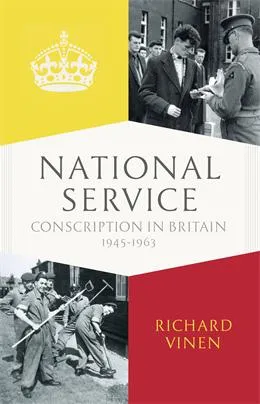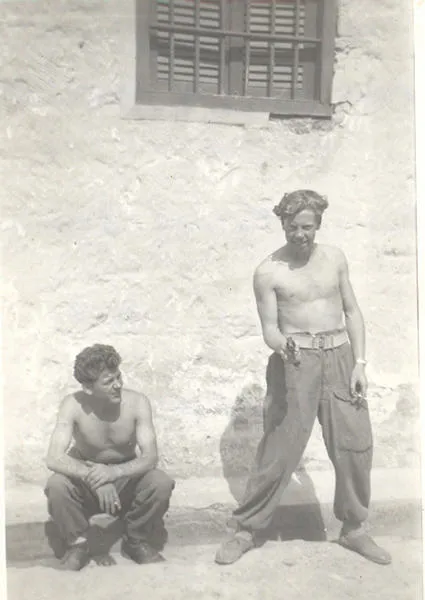02 October 2014
Inside the world of national service
Professor of History Richard Vinen discusses his latest book, which explores conscription in Britain between 1945 and 1963.

National Service: Conscription in Britain 1945-1963, published this summer by Penguin, is the latest book by Professor of History Richard Vinen.
The Times Higher Education called it a ‘pioneering study’ of a subject which lies ‘at the centre of British post-war history,’ while the Guardian tipped it to be ‘the most original social history book of 2014.’ It may also to prove to be one of the most timely.
‘2014,’ says Vinen, ‘is a good time to be thinking about the armed forces - both because of military anniversaries and because of current events. Of course, I did not plan it that way; a lot of sources have become available – partly because records of the Ministry of Labour and the various service ministries have been opened – and a large number of national servicemen have written memoirs or deposited their private papers in archives in the last few years. I was also keen to write it at a time when a good number of national servicemen were still around to talk to me.’
National Service represents the first academic attempt to get to grips with the reality of conscription and to establish its fundamental significance to our understanding of Britain’s post-war history. Vinen argues that its importance has until now been largely underestimated, both because of British historians’ relative lack of interest in military questions and because it has so often been treated as a source of amusement.
‘People tend to assume that the best writing on national service is comic,’ he explains, ‘and of course there are lots of funny stories – like Richard Ingrams being turned down for a commission because he was asked what he had played at public school and answered “The cello, Sir.” But national service as whole was not a joke. Sometimes, in interviews, men began by giving me favourable or even jocular accounts of their service, but then finished by telling, often off the record, horrific stories about matters such as the incidence of suicide attempts in basic training.’
Vinen identifies two broad areas where the impact of conscription was most keenly felt: Britain’s role in the wider world on one hand, and on the other the far-reaching societal consequences of some 3,000 young men per week being pressed into service across the country. ‘British military resources were tightly stretched in the post-war period and it is hard to see how the country could simultaneously have posted troops to Germany and, say, Malaya, if it had not been for conscription. In terms of society, its effect was partly to provide the state with information about the lives of young men. Research on conscripts fed into two reports that changed British society – the Wolfenden Report, which contributed to the legalization of male homosexuality, and the Crowther Report, which contributed to the establishment of comprehensive education. What effect it had on individual men is harder to say. In retrospect, many remember it in benign terms but, to judge from documents produced by the service department themselves, they rarely felt that way at the time.
This tendency to see national service through rose-tinted spectacles is a recurrent theme, perhaps most noticeable in the quietly persistent idea that conscription was somehow socially useful and character-building – seen for example in the recent reality TV series Bad Lads’ Army, which subjected supposedly delinquent young men to the rigours of basic training in an attempt to rehabilitate them. It’s a notion that Vinen calls ‘utterly bizarre.’
‘Conscription was introduced for purely military reasons, and the politicians who imposed it felt that it was a regrettable necessity rather than something desirable in itself. It is possible that national service had some beneficial side effects, but it’s equally possible that the Blitz had some “good” social effects – and no one suggests that we should ask the Luftwaffe to bomb London every summer.
‘I think that the myth of national service as socially useful comes from the fact that the period after it was abolished is often seen as a time when social discipline declined. But the relation between conscription and the culture of the 1960s is a complicated one. And in fact, if you compare this year’s commemorations of the First World War centenary with its fiftieth anniversary in 1964, it is striking how anti-military people were back then. I suspect that this was partly because so many men had seen the forces from the inside.’
By allowing readers such an in-depth insight into that world, National Service could be seen to lead them towards the same conclusion. So, is the book anti-military? ‘I don’t think so,’ Vinen concludes. ‘In recent years, the national mood has increasingly turned against war but, at the same time, become ever more prone to treat the soldiers who fight wars in a sympathetic or even sentimental fashion. Not all criticism of the armed forces should be treated as though it is a sign of “anti-militarism,” and being sceptical about the virtues of national service does not mean that I am hostile to national servicemen – especially not to the many former conscripts who took such trouble to help me with my research.’


